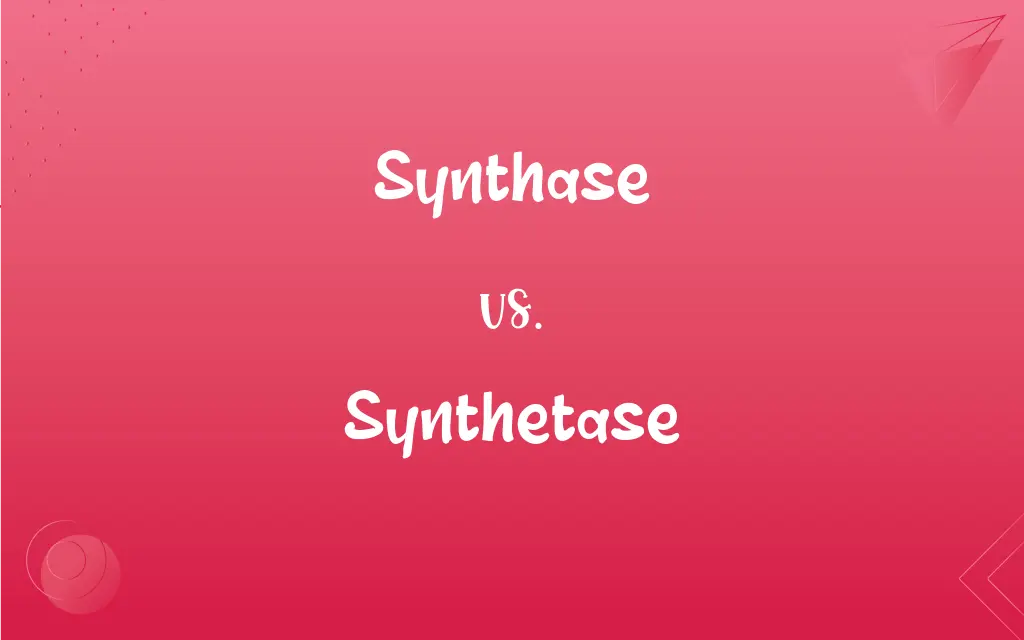Synthase vs. Synthetase: What's the Difference?
Edited by Aimie Carlson || By Janet White || Updated on October 4, 2023
Synthase is an enzyme that facilitates reactions without ATP consumption, while synthetase is an enzyme that requires ATP to catalyze the formation of chemical bonds.

Key Differences
In the realm of biochemistry, the terms "synthase" and "synthetase" refer to enzymes that play roles in chemical reactions. However, the primary distinction between the two lies in their energy requirements. Synthase enzymes can catalyze reactions without the need for ATP, the cellular currency of energy. Synthetase enzymes, conversely, rely on ATP to catalyze the bonding of molecules.
It's vital to understand the significance of ATP in these definitions. ATP, or adenosine triphosphate, is an energy-rich molecule. When an enzyme requires ATP, it often indicates that the reaction it facilitates is energy-consuming or endergonic. This is the case with synthetase, which uses ATP to drive the formation of bonds, typically between larger molecules.
On the other hand, synthase promotes reactions that do not necessitate an external energy source in the form of ATP. These reactions are often energy-releasing or exergonic. The synthesis process led by synthase is generally more straightforward than that of synthetase, given the absence of the ATP factor.
In many biochemical pathways, both synthase and synthetase enzymes play critical roles. For instance, in the citric acid cycle, synthase enzymes participate in the formation of certain intermediates. Meanwhile, synthetase enzymes are essential in processes like aminoacyl-tRNA synthesis during protein translation.
Both synthase and synthetase highlight the intricacies of cellular reactions, demonstrating that even subtle differences in nomenclature can point to profound differences in function and energy dynamics within the cell.
ADVERTISEMENT
Comparison Chart
ATP Requirement
Does not require ATP
Requires ATP
Type of Reaction
Endergonic (energy-releasing)
Exergonic (energy-consuming)
Common Reactions
Formation of intermediates
Bonding of larger molecules
Example Process
Citric acid cycle
Aminoacyl-tRNA synthesis
Nature
Simplified due to no ATP involvement
More complex due to ATP utilization
ADVERTISEMENT
Synthase and Synthetase Definitions
Synthase
An enzyme catalyzing reactions without ATP.
The citric acid cycle utilizes synthase for certain steps.
Synthetase
Essential for certain translation processes in cells.
During protein translation, synthetase's role becomes evident.
Synthase
Facilitator of energy-releasing biochemical reactions.
This reaction's energy dynamics are managed by synthase.
Synthetase
Facilitator of energy-consuming biochemical processes.
Synthetase ensures the molecules bond, consuming ATP in the process.
Synthase
Crucial in various metabolic pathways.
Several metabolic pathways employ synthase for efficient functioning.
Synthetase
Participant in exergonic cellular reactions.
Synthetase plays a role in this ATP-dependent reaction.
Synthase
A promoter of straightforward synthesis processes.
Synthase drives the formation of this intermediate molecule.
Synthetase
An enzyme catalyzing bond formation using ATP.
The reaction requires synthetase for ATP-driven bonding.
Synthase
Participant in endergonic cellular reactions.
In the absence of ATP, synthase ensures the reaction proceeds.
Synthetase
Instrumental in complex cellular synthesis.
Aminoacyl-tRNA synthesis heavily relies on synthetase.
Synthase
See synthetase.
Synthetase
Any of a group of enzymes that catalyze the synthesis of a compound. Also called synthase.
Synthase
Any enzyme that catalyzes the synthesis of a biological compound.
Synthetase
Any enzyme that catalyzes the synthesis of a biological compound.
Synthase
(dated) Such an enzyme that, more specifically, does not use ATP as a source of energy.
Synthetase
(dated) Such an enzyme that, more specifically, uses ATP as a source of energy.
FAQs
Does synthetase require ATP for its function?
Yes, synthetase requires ATP to catalyze bond formations.
Are synthase reactions energy-releasing or energy-consuming?
Synthase reactions are generally energy-releasing or endergonic.
What does synthase facilitate?
Synthase facilitates reactions without consuming ATP.
What's a key role of synthetase in protein synthesis?
Synthetase is essential for aminoacyl-tRNA synthesis during protein translation.
How does synthase aid in metabolic pathways?
Synthase aids by facilitating energy-releasing reactions in various pathways.
Is ATP essential for synthetase-driven reactions?
Yes, ATP is vital for reactions catalyzed by synthetase.
Are synthase and synthetase found in all cells?
Both enzymes are widespread, but their presence depends on the specific metabolic pathways of a cell.
Why is ATP consumption significant for synthetase's role?
ATP consumption drives the energy-consuming reactions that synthetase facilitates.
Are there multiple types of synthase and synthetase enzymes?
Yes, multiple enzymes fall under these categories, each with specific functions.
In what type of cellular reactions is synthetase involved?
Synthetase is involved in energy-consuming or exergonic reactions.
Can synthase operate without ATP?
Yes, synthase can catalyze reactions without ATP.
Where might one find synthase functioning in a cell?
Synthase might function in processes like the citric acid cycle.
Does synthase play a role in ATP synthesis?
No, synthase itself doesn't use ATP but may indirectly influence ATP production.
Why is synthetase's ATP requirement essential for its function?
The ATP provides the energy needed for the synthetase to catalyze bond formations.
Do synthase and synthetase operate independently in a cell?
They can function in different pathways but may also operate in tandem in specific metabolic processes.
Can synthase operate in an ATP-rich environment?
Yes, synthase can operate irrespective of ATP abundance.
Is there a connection between synthase and photosynthesis?
Yes, certain synthase enzymes are involved in the photosynthesis process.
How crucial is synthetase in protein translation?
Synthetase is vital for linking amino acids to tRNA, a key step in protein translation.
How does synthetase contribute to cellular energy dynamics?
Synthetase consumes ATP, influencing the energy balance within cells.
Do both enzymes have a similar structure?
While they may have structural similarities due to their enzymatic nature, their active sites and functions differ.
About Author
Written by
Janet WhiteJanet White has been an esteemed writer and blogger for Difference Wiki. Holding a Master's degree in Science and Medical Journalism from the prestigious Boston University, she has consistently demonstrated her expertise and passion for her field. When she's not immersed in her work, Janet relishes her time exercising, delving into a good book, and cherishing moments with friends and family.
Edited by
Aimie CarlsonAimie Carlson, holding a master's degree in English literature, is a fervent English language enthusiast. She lends her writing talents to Difference Wiki, a prominent website that specializes in comparisons, offering readers insightful analyses that both captivate and inform.































































